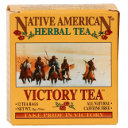Indian Love Tea
 |
|
Commercial Description
With a mellow ginger flavor, our Indian Love Tea is a rich blend of natural herbs, including high grades of select damiana, ginseng root, and muira puama.
Ratings & Reviews
Page 1 of 1 page with 1 review
 55 Aroma: 5/10 Flavor: 4/5 Value: 2/5
55 Aroma: 5/10 Flavor: 4/5 Value: 2/5Tchuggin' Okie (458 reviews) on Aug. 14th, 2022
This tea isn't easy to love, since the smell is weird, but I don't hate it, since the taste is decent, which may be the "love" in the tea offsetting my lack of love *for* the tea. If you can make sense of that, you're well-prepared for the ingredients list. It looks like something out of the Yogi Tea bazillion-herbs playbook, except swapping in a few more Western plants. Here goes: Blackberry leaf, sarsaparilla root, white oak bark, rose flower, ginseng root, muira puama, elecampane, angelica root, marjoram, licorice root, Missouri snake root, ginger, damiana, and "natural flavor". Okay, ginger and ginseng aren't Western, but in the latter case, the love-potion element has to come from somewhere. ;-) If you don't like any of the individual herbs, or have dread of the unknown, at least take consolation in this: with that many ingredients in a small bag (less than half the volume of a Celestial Seasonings or Murchie's bag), there's only a tiny dose of each.
I'd wager that this is a unique blend in all the herbal-tea world. I've never had muira puama (a South American woody jungle shrub), elecampane (a Eurasian herb in the aster family), angelica root (native to near-Arctic Europe), Missouri snake root (echinacea a.k.a. coneflower root) or damiana (a Mexican/Central American native plant promoted as an aphrodisiac) in a tea before—much less all in one. Those are a lot of new tastes, assuming any of them contribute flavor. Maybe that's why it's a strange experience, especially in the nose. At least the wet-bag aroma is straightforwardly the wet version of the dry-bag smell—far from the case with many teas. I just can't tell you what the smell is, outside of a peculiar herbal mishmash unique to my experience. "Musky" may be the best adjective, but not perfect. Fortunately the taste was dominated by the sarsaparilla and licorice, each of which I do like, rendering that my highest-rated element. The ginger comes out more in the aftertaste for me.
As for value, I rated it fairly low since a tea that costs several dollars (at the tourist gift shops where people usually get them), for just 12 undersized bags, better be of excellent quality. It ain't, but since I neither love nor hate the stuff, I suppose I'll finish it. With love, your friendly neighborhood RateTea reviewer.
Page 1 of 1 page with 1 review





